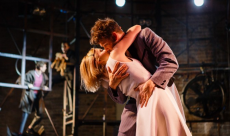
Email: EllaTournes@bexleygs.co.uk
Total Article : 45
About Me:Sixth form student currently studying English Literature, Drama and Theatre Studies, Classical Civilisation and History.

On 7th December 2015, I went to see ‘Dead Dog In A SuItcase and Other Lovesongs’ by Kneehigh Theatre Company. I saw the play at Shoreditch Town Hall – a small venue, where the audience sat close to the actors, creating a very intimate actor/audience relationship. The piece was adapted from ‘The Beggars Opera’ by John Gay, but set in a futuristic, dystopian context. The plot follows Macheath, a contract killer who is contracted to kill the Mayor by the Peachum family. In my opinion, Angela Hardie, (the actor that portrayed Polly Peachum) was particularly effective at conveying one of the play’s themes of female empowerment. When I was fortunate enough to speak to Mike Sheperd (the director) at a post-show discussion, he spoke about how Kneehigh aimed to make female characters less submissive and more multi-dimensional – not just accessories to male characters, as they were in ‘The Beggars Opera’. Angela Hardie uses her performance skills, and typically Kneehigh archetypal characterisation to depict Polly’s cathartic change from a typical naïve ‘hopeless romantic’ to ‘Black Polly’, highlighting the themes of feminism, corruption and power.
One of Hardie’s first appearances is during the wedding scene between Polly and Mac. Hardie and Dominic Marsh (Mac) emerge from an ensemble centre stage, immediately pulling focus. Hardie uses her performance skills to suggest Polly’s girlish, naïve, giddy infatuation with Mac, showing how easily Mac has deceived her, and how easy it will be for him to eventually corrupt her. On the line ‘you’re bad, but you’re that bad!’ Hardie maintains a close proximity to Marsh, their noses almost touching, showing supposed intimacy in their relationship. She caresses his face with her fingertips, slowly, gently and indirectly, to show subconscious affection. She uses her facial expression to grin widely, raise her eyebrows and widen her eyes, to appear innocent. She also looks up at him and maintains eye contact, depicting her lower status. She speaks in a breathy, high-pitched voice, appearing childlike and naïve. This infatuation highlights the theme of female empowerment in the play by showing an inherent lack of it; Mac has Polly hopelessly devoted to him in every way, giving him power over her.
During the wedding scene, Mac kisses Polly. Hardie uses her performance skills to show Polly’s submissive nature at this point in the play. She physically submits to Marsh, allowing him to dip her backwards and stand over her. She is then in a precarious physical position, showing her vulnerability and trust in him as she clings onto him by the neck to keep herself from falling. She then uses exaggerated body language typical of an archetypal ‘damsel in distress character’, lifting one of her legs up and leaning her head back exaggeratedly. This stance makes her desire for a perfect love story, and her naïve dependence on Mac explicit – dependence that disempowers her and conveys the themes of power, and female empowerment (or lack of it) in the play.
In the scene where Polly defends her new husband to her parents, Hardie portrays her as immature, petulant and childlike. The Peachums and Mac clash because of differing political ideologies (another theme in the play), Mac supporting anarchism and the Peachums supporting Conservatism. Polly attempts to argue against this clash by lamenting the words, ‘I love him.’ She shows her immaturity through her extremes of voice – a high-pitched wail on ‘love’, and a low-pitched sob on ‘him’. This makes Polly seem melodramatic, overemotional and young; completely susceptible to Mac’s ways. She uses her facial expression to portray naivety, keeping her eyes wide and doe-like, her eyebrows raised. She pouts her mouth exaggeratedly to show her adolescent stubbornness. She then throws her arms down suddenly and indirectly, her fists tightly clenched in a ball, and stamps her foot exaggeratedly, akin to a child throwing a tantrum. She keep a straight posture, and adopts large, hyperbolic hand gestures, throwing her arms in front of her on the word ‘love’ in an attempt to out-status and overpower her parents. The extremes of Hardie’s characterisation at this point conveys, her immaturity, and her lack of control over her own situation – therefore conveying her lack of power at this point in the play.

Polly’s distinctive moment of cathartic change happens during the song ‘Black Polly’. Hardie appears more mature and despondent than before - more bitter and angry than whiny and upset. She sings, ‘death to poor Polly, poor pretty Polly’ in a flatter, lower voice than she sang in before, showing a lack of emotion. She doesn’t sing with the same squeaks or gasping breaths as she did before, all of the little affections have been taken out of her voice and she sings more or less without animation, except for a slightly sarcastic tone on the words ‘poor’ and ‘pretty’. To further contrast her previous characterisation with her new ‘Black Polly’ characterisation, she sings the song with an emotionless, deadpan face, eyes searching the floor, not engaging with the audience. To show her resentment towards Mac and the way she’s allowed him to dupe her, she arches her eyebrow slightly, curls her upper lip into a snarl, and narrows her eyes on ‘pretty Polly’. She uses her posture to appear slumped, with her head bowed; her former confidence and naivety is gone, and she seemingly has the weight of her own corrupted world on her shoulders. The stark contrast in characterisation between the ‘old and new’ Polly that Hardie implements using her performance skills conveys how by being submissive, Polly’s allowed Mac to overpower and corrupt her.
The theme of female empowerment is shown in its full capacity in the scene where Polly visits Mac in prison. ‘Black’ Polly is so different to the submissive, girlish Polly the audience saw at the beginning of the play – she is angry, and vengeful. On the line, ‘you promised never to call me that!’ Hardie uses her vocal skills to shout the word ‘never’ loudly, with a raised dynamic, but without the high-pitched, whiny tone she has at the beginning of the play. Her tone is now much more aggressive, lower, gruffer, threatening. She shouts the words in Mac’s face, using her proxemics to appear intimidating, showing her anger at him and the situation he’s put her in. Her disgust at Mac is made explicit in her changed attitude towards him – she points the knife at him in a very forceful, direct manner, and makes her eyes flash with anger with narrowing them quickly. This change in their relationship, and the power dynamics in it convey Polly’s empowerment; she is no longer blind to Mac’s manipulative ways, she sees him for who he truly is, she’s not naïve anymore. It is also interesting that as Hardie adopts a more powerful character, she makes inadvertently becomes more masculine. Her voice becomes lower, and she adopts a more powerful stance, her shoulders broad, her chest puffed out, and her legs further apart.
Hardie uses her performance skills to convey Polly’s stark cathartic change from the beginning of the play to the end of the play, changing her characterisation completely. This conveys the plays themes of female empowerment, corruption and power in a really clear, effective way. The way that Hardie changed the character made the whole play so much easier for a 21st century audience to relate to, and made me enjoy it so much more.
Sources:
http://www.kneehigh.co.uk/show/dead-dog-in-a-suitcase-and-other-love-songs.php

0 Comment:
Be the first one to comment on this article.